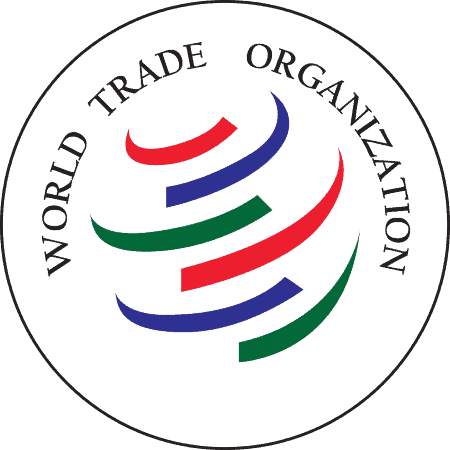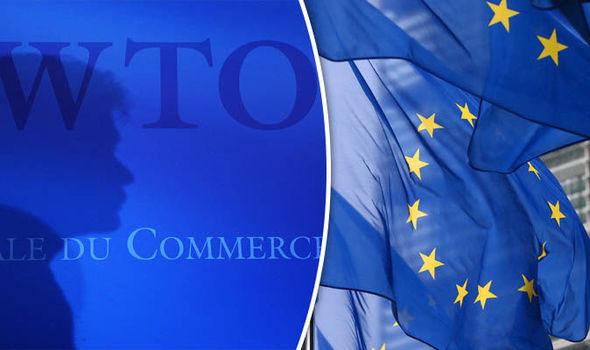Uncategorised
11. Case Study: EU & WTO
No country is able – nor it has the resources necessary – to produce all the needed goods on its own. Most countries share their trading business with others, exchanging material, labor force or the already produced goods. International trade creates a global market in which all countries can trade based on their individual abilities. Cooperation within a region like Europe or even worldwide provides stability, enhancing fair competition, free labor movement, and fair prices.

The European Union (EU) is a political and economic union of 27 states with a total pop. of more than 400 million citizens. The EU was established in 1993, but the union traces its origins to the European Coal and Steel Community established after WWII in 1951 to secure peace through economic integration.
The EU has its own governmental bodies and legal institutions – for example, the European Parliament, the European Commission, the European Council, the Court of Justice, and the European Central Bank. EU legislation is binding for all EU member states and the governments of member states must incorporate EU laws into their national legislation.
The EU has developed an internal single market through a standardized system of laws. This European Single Market guarantees the free movement of goods, capital, services, and labor – the ‘four freedoms‘ – within the European Union.
| Freedom of Goods | Many products on the EU market are subject to harmonized rules that protect consumers, public health, and the environment. Once goods have been admitted into the market they cannot be subjected to customs duties, discriminatory taxes, or import quotas. |
| Freedom of Capital | Restrictions on capital movements across borders were prohibited. European citizens and companies can open bank accounts, buy company shares, raise money, or purchase real estate in all EU countries. |
| Freedom of Services | EU companies, as well as self-employed persons, have the freedom to establish themselves in other EU countries and have the freedom to provide services in countries other than the one in which they are established. |
| Freedom of Labour | EU citizens can move freely between member states to live, work, study or retire in another country. About 1.7 million people commute to work across a European border each day, and in some regions, these people constitute up to a third of the workforce. |
Today, the European Single Market is the largest single market in the world, which has lead to greater competition in services, the removal of trade barriers, the reduction of business costs, and the elimination of anti-competitive practices such as monopolies.
The EU actively negotiates trade agreements with non-EU countries. These agreements grant mutually-beneficial access to the markets of both the EU and the countries concerned. Each agreement is unique and can include tariff reductions, rules on matters such as intellectual property or sustainable development, or clauses on human rights.

The World Trade Organization (WTO) is an intergovernmental organization with 164 member states dealing with the rules of international trade between nations. The WTO officially commenced in 1995, replacing the General Agreement on Tariffs and Trade (GATT), which commenced in 1948.
The WTO provides a forum for negotiating agreements aimed at reducing obstacles to international trade and ensuring a level playing field for all, thus contributing to economic growth and development. More specifically, the WTO’s main activities are:
- negotiating the reduction or elimination of obstacles to trade (e.g. import tariffs) and agreeing on rules governing the conduct of international trade (e.g. anti-dumping)
- monitoring the application of the WTO rules and the trade policies of its members
- settling disputes among its members regarding the application of the agreements
WTO supporters argue that the opening of national markets to international trade – with justifiable exceptions and some flexibility – will contribute to sustainable development, raise people’s welfare, reduce poverty, and foster peace and stability. However, critics reply that the WTO has a systematic bias toward rich countries and multinational corporations, harming smaller countries which have less negotiation power.

So far, the EU has played a central role in developing the international trading system since World War II. Currently, the EU is exploring the possibility of modernizing the WTO. Like the WTO, the EU was originally designed to remove customs barriers and promote trade between its member states.
Both the European Union and all the individual EU countries are members of the WTO. However, the EU operates as a single actor at the WTO and is represented by the European Commission rather than by the member states. The Commission negotiates trade agreements and defends the EU’s interests before the WTO on behalf of all 27 member states.
The European Commission has put forward a first set of ideas to modernize the WTO and to make world trade rules fit for the challenges of the global economy. During the last decade, progress and reform initiatives have stalled due to significant differences between developed nations (led by the European Union, the United States, Canada, and Japan) and the major developing countries (led by India, Brazil, China, and South Africa). There is also considerable contention against and between the EU and the US over their maintenance of subsidies.
Slow reform developments at the WTO are also a sign that the international trading system has changed dramatically in the past 20 years. The system has evolved, with new actors – essentially transition and developing countries – playing a central role.
Free trade and growth of imports/exports in Europe as well as in the WTO have been important factors in raising living standards and in reducing poverty. The liberalization of the international trading system has benefited some developing countries, which have experienced an unprecedented phase of sustained economic growth. However, the EU and the WTO have to ensure that developing countries become fair partners and that reforms will improve not only economic but also environmental and social conditions. Furthermore, both institutions have to be able to reform themselves constantly to stay successful international key figures.

Economics is the study of how goods and services are produced, distributed, and consumed. It is the theory of how markets work and wealth is distributed including how scarce resources are allocated. We hope that taking this course helped you understand the wide range of topics that drive economics.

